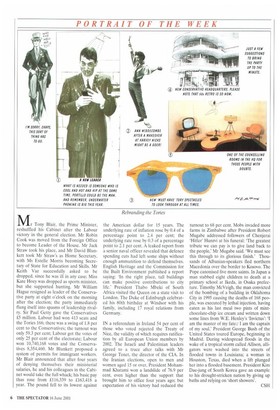M r Tony Blair, the Prime Minister, reshuffled his Cabinet after
the Labour victory in the general election. Mr Robin Cook was moved from the Foreign Office to become Leader of the House. Mr Jack Straw took his place, and Mr David Blunkett took Mr Straw's as Home Secretary. with Ms Estelle Morris becoming Secretary of State for Education and Skills. Mr Keith Vaz successfully asked to be dropped, since he was ill in any case; Miss Kate Hoey was dropped as sports minister, but she supported hunting. Mr William Hague resigned as leader of the Conservative party at eight o'clock on the morning after the election; the party immediately flung itself into spasms of leadership rivalry. Sir Paul Getty gave the Conservatives £5 million. Labour had won 413 seats and the Tories 166; there was a swing of 1.8 per cent to the Conservatives; the turnout was only 59.3 per cent; Labour got the votes of only 25 per cent of the electorate; Labour won 10,740,168 votes and the Conservatives 8,354,460. Mr Blunkett proposed a system of permits for immigrant workers. Mr Blair announced that after four years of denying themselves their ministerial salaries, he and his colleagues in the Cabinet would take the full whack; his basic pay thus rose from £116,339 to £163,418 a year. The pound fell to its lowest against
the American dollar for 15 years. The underlying rate of inflation rose by 0.4 of a percentage point to 2.4 per cent; the underlying rate rose by 0.3 of a percentage point to 2.1 per cent. A leaked report from a senior naval officer revealed that defence spending cuts had left some ships without enough ammunition to defend themselves. English Heritage and the Commission for the Built Environment published a report saying: 'In the right place, tall buildings can make positive contributions to city life.' President Thabo Mbeki of South Africa visited the Queen on a state visit to London. The Duke of Edinburgh celebrated his 80th birthday at Windsor with his family, including 17 royal relations from Germany.
IN a referendum in Ireland 54 per cent of those who voted rejected the Treaty of Nice, the validity of which requires ratification by all European Union members by 2002. The Israeli and Palestinian leaders agreed to a truce after talks with Mr George Tenet, the director of the CIA. In the Iranian elections, open to men and women aged 15 or over, President Mohammad Khatami won a landslide of 76.9 per cent, even higher than the support that brought him to office four years ago; but expectation of his victory had reduced the turnout to 68 per cent. Mobs invaded more farms in Zimbabwe after President Robert Mugabe addressed followers of Chenjerai 'Hitler' Hunzvi at his funeral: 'The greatest tribute we can pay is to give land back to the people,' Mr Mugabe said. 'We must see this through to its glorious finish.' Thousands of Albanian-speakers fled northern Macedonia over the border to Kosovo. The Pope canonised five more saints. In Japan a man stabbed eight children to death at a primary school at Ikeda, in Osaka prefecture. Timothy McVeigh, the man convicted of the bombing of a building in Oklahoma City in 1995 causing the deaths of 168 people, was executed by lethal injection, having eaten as his last meal two pints of mintchocolate-chip ice cream and written down some lines from W.E. Henley's Invictus': 'I am the master of my fate:/ I am the captain of my soul.' President George Bush of the United States toured Europe, beginning in Madrid. During widespread floods in the wake of a tropical storm called Allison, alligators were washed into the streets of flooded towns in Louisiana; a woman in Houston, Texas, died when a lift plunged her into a flooded basement. President Kim Dae-jung of South Korea gave an example to his drought-stricken nation by giving up baths and relying on 'short showers'.


































































 Previous page
Previous page